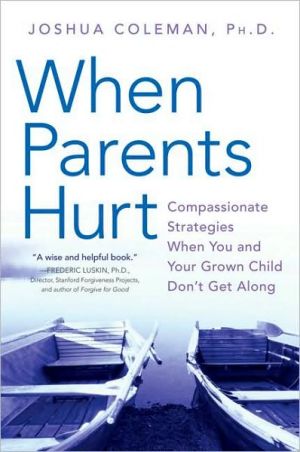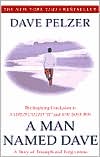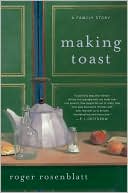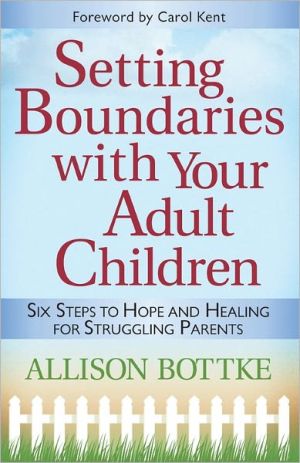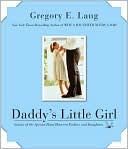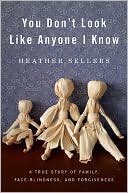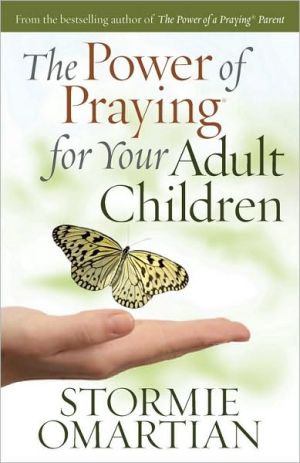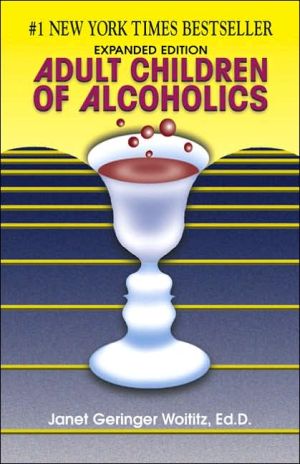When Parents Hurt: Compassionate Strategies When You and Your Grown Child Don't Get Along
In When Parents Hurt, psychologist and parent Joshua Coleman, Ph.D., offers insight, empathy, and perspective to those who have lost the opportunity to be the parent they desperately wanted to be and who are mourning the loss of a harmonious relationship with their child. Through case examples and healing exercises, Dr. Coleman helps parents:\ \ Reduce anger, guilt, and shame\ Learn how temperament, the teen years, their own or a partner's mistakes, and divorce can strain the parent-child...
Search in google:
In When Parents Hurt, psychologist and parent Joshua Coleman, Ph.D., offers insight, empathy, and perspective to those who have lost the opportunity to be the parent they desperately wanted to be and who are mourning the loss of a harmonious relationship with their child. Through case examples and healing exercises, Dr. Coleman helps parents: Reduce anger, guilt, and shame Learn how temperament, the teen years, their own or a partner's mistakes, and divorce can strain the parent-child bond Come to terms with their own and their child's imperfections Develop strategies for rebuilding the relationship or move toward acceptance of what can't be changed By helping parents recognize what they can do and let go of what they cannot, Dr. Coleman helps families develop more positive ways of healing themselves and relating to each other. Publishers Weekly Parenting and relationship expert Coleman points out that one can be a devoted parent and still have things run amok. Parents who have made mistakes and those who haven't can both be involved in a hurtful relationship with an older child; Coleman's focus is on helping the parent cope and carry on. In individual chapters, he explores the many reasons why a relationship can falter, examining how divorce, mismatches in child/parent personalities and the demands of a competitive society can adversely affect the child/parent relationship. Using case studies from his psychology practice as well as his own experiences as a divorced father who once faced a difficult time with his eldest daughter, Coleman provides strategies for managing the guilt and regret that can arise in parents as children grow into teens and young adults. He advises parents to take responsibility for their past actions, to make amends, to forgive both themselves and their children, and to move guilt and shame to the background and gratitude to the foreground. By following these "essential principles," Coleman claims, emotionally wounded parents will begin to overcome the pain of relationships gone awry and move on to a more hopeful future. Coleman's personable writing style makes this an engaging read despite the serious subject matter. (June)Copyright 2007 Reed Business Information
When Parents Hurt\ Compassionate Strategies When You and Your Grown Child Don't Get Along \ Chapter One\ Parents on the Firing Line\ \ Dear Mom,\ I have decided that I don't want to have any contact with you ever again. Please don't write or call me anymore. I can't stop thinking about all of the ways that you were never there for me when I was growing up. Whenever I see or talk to you, I just end up feeling depressed, angry, and upset for weeks afterwards. It's just not worth it to me and I need to get on with my life. Please respect my wishes and don't contact me again.\ Letter from Clarice, 23, to her mother Fiona, 48\ \ Fiona sat on my couch in her first visit without looking at me or saying anything. She reached into her purse and handed me the letter from her daughter as if to say, "This says it all." And it did. As a psychologist, I've counseled many adult children like Fiona's daughter; in some cases, I've helped them to craft letters just like hers, or supported them in cutting off contact with a mother, a father, or both. I know the finality that these letters can portend. It's a deadly serious business and the stakes are huge—a therapist has no business giving advice in this arena unless he or she has carefully thought about the long-term implications of these decisions.\ I felt for this desolate mother sitting in front of me because I knew that the letter could be the last contact that Fiona would ever have with her daughter. A flood of questions were already circulating in my mind. "Why is her daughter so angry at her? What has Fiona done to try to repair it? Howcapable has she been of taking responsibility or listening in a non-defensive way to her daughter's complaints? How receptive will she be to my recommendations for how to respond?"\ "I'm sorry," I said, handing back the letter. "That must be so painful."\ Fiona looked relieved, as though she had expected me to blame her. "I worry about her all of the time and can't stop wondering what horrible thing I did to make my own child turn against me? I'm sure I made my fair share of mistakes, but I wasn't that different with her than I was with the other three." She started sobbing. "Clarice was always the hardest of my four children. Even when she was young, she seemed so impossible to please. We did everything for her: individual therapy, family therapy, medication, you name it—nothing seemed to make her feel happy or connected to us. My other kids resented her because she sucked all of the time, energy, and money out of the family that should have gone to all four of them. She won't talk to my other kids, either, except for the youngest. It's really heartbreaking," she said, grabbing for the Kleenex. "It is so goddamned heartbreaking!"\ Are Parents to Blame?\ Not that long ago I would have assumed that Fiona must have done something terribly wrong to cause her daughter to respond in such a dramatic way. My training as a psychologist taught me that the problems of the adult child can always be linked to some form of mistreatment from the parent. While this is often true, it doesn't hold for all families. And when it is true, it's often a far more complex picture than most therapists and self-help authors realize.\ As I worked with Fiona over the next few months, I came to understand that she had been a reasonable and conscientious mother. As her story and others illustrate, it is possible to be a devoted and conscientious parent and still have it go badly. You can do everything right and your child can still grow up and not want to have the kind of relationship with you that you always hoped you'd have. You can do everything right, and your child may still end up with a drug problem that costs you thousands of dollars and endless heartache. You can do everything right and your child may still choose the kind of friends or partners that you never imagined she would have chosen because these people seem so lost and are dragging your child into losing more. You can do everything right and your child can still fail to launch a successful adulthood despite being gifted and talented or possessing an IQ that most people would kill for.\ Very few of us escape feeling guilt toward our offspring. It may be part of our evolutionary heritage, a way that nature hardwires us to stay sensitive to them, even after they're grown. And some parents are responsible for transgressions that are harmful to their children: child abuse, incest, neglect, and alcoholism are a few of the more egregious examples. However, whether the parenting mistakes are subtle or serious, real or imagined, today's parents are completely confused by their children's failures and accusations. They need guidance and support for themselves, not more advice about their children.\ Who is this book for?\ This book is written for:\ \ Parents who carry enormous feelings of guilt, shame, and regret about how they treated their children.\ Parents raising children with a diagnosis or temperament that makes them harder to parent, and maybe harder to love.\ Parents whose divorces have created a profound change in the quality of their relationship with their child. This includes children who are rejecting or blaming them, refusing contact with them, or seem to be damaged by the divorce.\ Parents whose current or ex-spouses are dedicated to bringing them down in the eyes of their child.\ Parents who were devoted and conscientious, yet their adult child refuses contact with them.\ Parents whose partner (parent/stepparent, boyfriend/girlfriend) makes it difficult to provide the kind of safety or nurturance that they want to give their children.\ Parents who are mismatched in some important way with their child: for example, a successful and driven parent with a learning disabled child; a vulnerable, insecure parent with an aggressive and rejecting child; a depressed parent with an active/risk-taking child.\ Parents who are wounded by their grown child's inability to launch a happy or successful life.\ \ When Parents Hurt\ Compassionate Strategies When You and Your Grown Child Don't Get Along. Copyright © by Joshua Coleman. Reprinted by permission of HarperCollins Publishers, Inc. All rights reserved. Available now wherever books are sold.
\ Frederic Luskin“A wise and helpful book.”\ \ \ \ \ Steven Mintz“Joshua Coleman’s book is a gift, offering extraordinary wisdom coupled with practical advice.”\ \ \ Doctor"An especially healing, practical resource. . .for anyone exhausted by strained, hurtful relationships with their adolescent or grown child."\ \ \ \ \ Hara Estroff Marano“I LOVE this book. [It] is written from such a realistic and compassionate perspective that it is heart-warming.”\ \ \ \ \ Stephanie Coontz"Exceptionally perceptive."\ \ \ \ \ Heather Folsom". . .desperately needed. . . a truly great book for parents, and a great book for therapists who work with families."\ \ \ \ \ Jan Levine"This is an incredibly insightful and sensitively written analysis of a difficult subject. . . .I have recommended it to many of my clients. . . I highly recommend it to all parents who hurt."\ \ \ \ \ Baltimore Sun“An important book that can help parents heal.”\ \ \ \ \ Publishers WeeklyParenting and relationship expert Coleman points out that one can be a devoted parent and still have things run amok. Parents who have made mistakes and those who haven't can both be involved in a hurtful relationship with an older child; Coleman's focus is on helping the parent cope and carry on. In individual chapters, he explores the many reasons why a relationship can falter, examining how divorce, mismatches in child/parent personalities and the demands of a competitive society can adversely affect the child/parent relationship. Using case studies from his psychology practice as well as his own experiences as a divorced father who once faced a difficult time with his eldest daughter, Coleman provides strategies for managing the guilt and regret that can arise in parents as children grow into teens and young adults. He advises parents to take responsibility for their past actions, to make amends, to forgive both themselves and their children, and to move guilt and shame to the background and gratitude to the foreground. By following these "essential principles," Coleman claims, emotionally wounded parents will begin to overcome the pain of relationships gone awry and move on to a more hopeful future. Coleman's personable writing style makes this an engaging read despite the serious subject matter. (June)\ Copyright 2007 Reed Business Information\ \ \ \ \ Library JournalA recognized parenting, family, and relationship expert and a father of three, Coleman (The Lazy Husband: How To Get Men To Do More Parenting and Housework) presents a superb treatment for parents wounded emotionally or psychologically by their children. Given immediacy by the author's own admissions and experiences, the work is an accessible, hopeful exploration of the pain and loss surrounding problematic parent and teen/adult child relationships. Coleman begins by acknowledging the shame parents feel when relationships with their offspring go bad. He then offers a mix of approaches through tips for rebuilding the relationship-these include guidelines, cognitive-behavioral exercises, education, and practical advice. He further provides comfort and realistic counsel for multiple sources of tension (e.g., divorce, substance abuse) and, in cases where a relationship cannot be mended, he gives strategies for acceptance and serenity. This is a hot topic-see, e.g., Jane Isay's Walking on Eggshells, Susan Jonas and Marilyn Nissenson's Friends for Life, and Deborah Tannen's You're Wearing That?-but Coleman takes a unique and groundbreaking approach. An eyeopening read for anyone; essential for public libraries.\ —Shawna Thorup\ \ \
